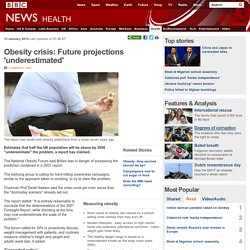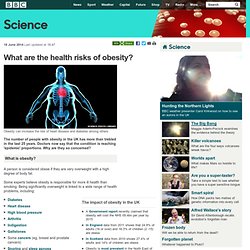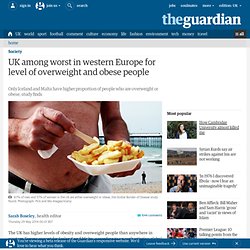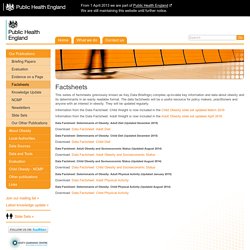

07-1184x-tackling-obesities-future-choices-report. Obesity crisis: Future projections 'underestimated' 13 January 2014Last updated at 07:38 ET The report cast doubt over obesity predictions from a study seven years ago Estimates that half the UK population will be obese by 2050 "underestimate" the problem, a report has claimed.

The National Obesity Forum said Britain was in danger of surpassing the prediction contained in a 2007 report. The lobbying group is calling for hard-hitting awareness campaigns, similar to the approach taken to smoking, to try to stem the problem. Chairman Prof David Haslam said the crisis could get even worse than the "doomsday scenario" already set out. Continue reading the main story Measuring obesity The report stated: "It is entirely reasonable to conclude that the determinations of the 2007 Foresight Report, while shocking at the time, may now underestimate the scale of the problem. " The forum called for GPs to proactively discuss weight management with patients, and routinely measure children's height and weight and adults' waist size, it added. 'Concerted action'
Child obesity: Why do parents let their kids get fat? 25 September 2012Last updated at 23:15 ET By Denise Winterman BBC News Magazine The health risks for obese children may be even greater than previously estimated, new research suggests.

So why do parents let their children get fat? The recent start of the new school year was greeted with reports of a dramatic rise in demand for extra-large uniforms for primary school pupils. It came as no surprise to Carol. Her two nieces were wearing size 14 skirts by the age of 11, the average size worn by a grown woman in the UK. Her son also struggled to find a uniform big enough at secondary school as his weight crept up to nearly 20 stone (127kg) in his teens. BBC Science - What are the health risks of obesity? 18 June 2014Last updated at 16:47 Obesity can increase the risk of heart disease and diabetes among others The number of people with obesity in the UK has more than trebled in the last 25 years.

Doctors now say that the condition is reaching 'epidemic' proportions. Why are they so concerned? A person is considered obese if they are very overweight with a high degree of body fat. Some experts believe obesity is responsible for more ill health than smoking. The most common way to assess if a person is obese is to check their body mass index. If your BMI is above 25 you are overweight. Another useful method is to take a waist measurement because fat in the centre of the body (apple-shaped obesity) is much more strongly linked to health risks than fat more widely distributed on the arms and legs. UK among worst in western Europe for level of overweight and obese people. The UK has higher levels of obesity and overweight people than anywhere in western Europe except for Iceland and Malta, according to an authoritative global study that raises fresh concerns about the likely health consequences.

The study, which uses data from 1980 to 2013, found that the number of overweight and obese people in the world had surged in the past three decades. About 2.1 billion people – nearly 30% of the population of the planet – are overweight or obese, raising the risk of diabetes, heart disease and cancers. Although the rise in obesity rates seems to be slowing in some countries, it has yet to be reversed in any. "Obesity is an issue affecting people of all ages and incomes, everywhere," said Dr Christopher Murray, director of the Institute of Health Metrics and Evaluation (IHME) in Seattle and a co-founder of the Global Burden of Disease study. More than half of the world's 671 million obese people (as opposed to overweight and obese) live in 10 populous countries.
Public Health England Obesity Knowledge and Intelligence team. This series of factsheets (previously known as Key Data Briefings) compiles up-to-date key information and data about obesity and its determinants in an easily readable format.

The data factsheets will be a useful resource for policy makers, practitioners and anyone with an interest in obesity. They will be updated regularly.